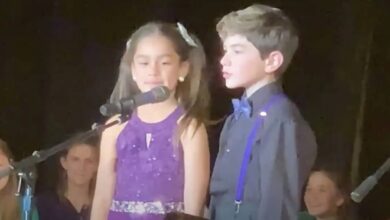Heart’s “Stairway To Heaven” Moved The Songwriters To Tears, Emphasizing Its Profound Impact On The Audience And Listeners
The unparalleled rendition of “Stairway to Heaven” by the iconic duo Heart at the Kennedy Center Honors represented more than just a musical tribute; it was a heartfelt celebration of rock history and an homage to the profound influence of Led Zeppelin on the music industry. Ann and Nancy Wilson, the powerful sisters who make up Heart, have long been recognized for their contributions to the rock genre, particularly in empowering women musicians. Their ability to merge hard rock with deeply emotional ballads has earned them a place in the hearts of fans across generations, making their interpretation of this classic song particularly poignant.
The context of the performance is significant, as the Kennedy Center Honors is a revered recognition that celebrates artists who have made significant impacts on American culture. By being included in this prestigious event, Heart not only acknowledged Led Zeppelin’s legacy but also brought attention to their own journey as trailblazing female artists in a largely male-dominated industry. With classics like “Barracuda” and “Crazy on You,” Heart has long been recognized for their stunning vocal harmonies and guitar prowess, and their version of “Stairway to Heaven” was a powerful extension of that legacy.
Led Zeppelin’s influence reaches far beyond their own songs, breathing life into musical movements and inspiring countless artists in various genres. The band’s commitment to blending various musical styles—such as blues, rock, and folk—paved the way for a new era of experimentation in music. Their lyrics often explore themes of mythology, love, and the human experience, allowing their music to resonate deeply with a diverse audience. Such lasting appeal underscores their status as one of the most important rock bands of all time.
At the gala, Heart’s performance was highlighted not only by their vocal capabilities but also by the emotional gravitas of the occasion. The addition of Jason Bonham, son of the late Led Zeppelin drummer John Bonham, brought a personal touch to the performance. He represented a link to the original band, sharing in a moment that was both a tribute and a celebration of legacy. The synergy created on stage was electric, weaving together the past and present through music.
The gospel choir that accompanied Heart added a soulful dimension to the performance, reflecting the communal spirit that music often embodies. The choir, dressed in bowler hats, paid homage to the band while enhancing the chorus and adding layers of harmony that intertwined beautifully with Ann and Nancy’s powerful voices. This arrangement enriched the performance, underscoring the importance of collaboration and collective expression in music.
As “Stairway to Heaven” unfolded, each note carried with it a story—a tale of longing, hope, and transcendence. The audience, a mix of industry icons and dignitaries, shared in a collective emotional experience, a unifying bond almost palpable in the air. Moments like these remind us of the strength of music to bridge divides and evoke a shared sense of humanity, transcending generational barriers and cultural boundaries.
The performance culminated in an electrifying standing ovation, a spontaneous outpouring of appreciation from those present. In that moment, the audience not only celebrated Heart’s artistry but also paid homage to the song itself, which remains one of the most recognizable and beloved compositions in rock history. This reaction was not just a reflection of the performance but also a testament to the song’s enduring legacy, showcasing the respect and admiration that “Stairway to Heaven” commands even decades after its release.
In the aftermath of the performance, the reactions from Led Zeppelin members added another layer of significance. Robert Plant, visibly moved by the tribute, expressed his admiration for Heart’s rendition, capturing the emotional weight that the song still holds for him. Similarly, Jimmy Page’s praise underscored the respect for a rendition that resonated with authenticity and reverence. Their acknowledgments showcased the importance of honoring the past while allowing new interpretations to breathe life into classic works.
This unforgettable evening encapsulated the transformative power of music, illustrating how it can connect artists across generations. The merging of Heart and Led Zeppelin on such a monumental evening speaks to a shared respect for creativity and the craft of musicianship. The harmony between past and present demonstrated the timelessness of great music while inspiring future generations of musicians to explore and innovate within their own creative journeys.
Ultimately, performances like this serve as a reminder that music is a universal language—capable of evoking deep emotions and connecting people through shared experiences. The collaboration between Heart and the essence of Led Zeppelin illustrates how songs can transcend their original context, becoming woven into the fabric of our cultural landscape. In celebrating classic compositions, artists remind us of the enduring nature of music and its ability to inspire, uplift, and bring people together, regardless of their individual backgrounds.





